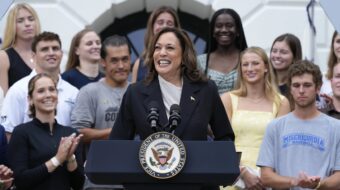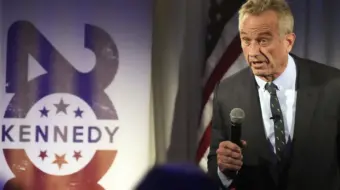The honesty-impaired Bush administration does not limit its deception to weapons of mass destruction in Iraq. When it comes to taxes, the spin starts when they call their program the “Jobs and Growth Tax Relief Act of 2003.” If this legislation was breakfast cereal, the Consumer Protection Agency would be forced to prosecute the Bush administration for misleading packaging and lying about the ingredients. It would be more accurate to call it the “Economic Destruction and Millionaire Welfare Act.”
Columnists in major newspapers across the country have exposed the “tax cut” as yet another gift to the wealthy, who receive almost all of the permanent benefits. Some (including in this newspaper) have pointed out that the legislation is actually a weapon of tax destruction, whose goal is to starve the government of revenue and force it to cut spending for health, education, housing and, eventually, Social Security.
In order to gain political cover for this robbery, the administration allowed a few crumbs for many working families – a temporary increase in the child tax credit, with the added propaganda value of rebate checks being mailed out this summer. But even this measure has come under attack, because low income workers get reduced benefits, or nothing at all.
Which brings us to the latest round of Bush’s dancing with truth.
As described by Paul Krugman in The New York Times, “Tim Russert [of “Meet the Press”] asked the Treasury Department to prepare examples showing how repealing the Bush Tax cuts would affect ordinary families.” These examples were also released to other media at a Treasury news conference. They show that six families, with incomes between $40,000 and $80,000, will receive tax cuts in 2003 ranging from $720 to more than $1,900.
Fortunately, Robert Greenstein of the Center for Budget and Policy Priorities took a second look at the figures. He showed that the families chosen by Treasury are hardly typical. Over one quarter of the households in the U.S. will get no tax cut, and half will get less than $500. But all of the Treasury’s examples get over $700. And four of the six examples get over $1,700 – while only about one out of six real families get that much. Greenstein shows many other ways that Treasury’s examples are completely unrepresentative of ordinary families.
In focusing on those middle- and upper-middle income families who qualify for significant tax cuts, the Treasury Department also ignores most of the cuts, which go to the very rich. The biggest stockholders with fat dividend checks and windfall capital gains could each save millions under the provisions of the “Jobs and Growth Tax Relief Act.”
Martin Sullivan, in the June issue of the highly respected journal Tax Notes, is most distressed at the decline of professionalism in the Treasury Department. He notes that Treasury has developed excellent tools for estimating the distributional effect of changes in the tax code – that is, how the changes affect households at different income levels. But, “The Treasury Department now releases only the most rudimentary of distributional analyses. The repackaging … is clearly politically motivated by the arrival of the Bush administration officials in the White House and in the Treasury.” Sullivan goes on to say, “If this continues, the Treasury’s Office of Tax Policy (OTP) may have to change its name to the Office of Tax Propaganda.”
By the way, it makes a difference. When Tim Russert interviewed Howard Dean on “Meet the Press,” he used Treasury’s misleading figures as if they represented typical Americans. Dean handled himself well, saying, “I don’t believe [the Treasury figures]. The administration has not been candid about the impacts of this tax cut.” But right-wing commentators are already using that interview to attack Dean’s call to roll back the Bush tax cuts. Expect to see a lot more White House distortion as the campaign heats up.
The author can be reached at economics@cpusa.org












Comments